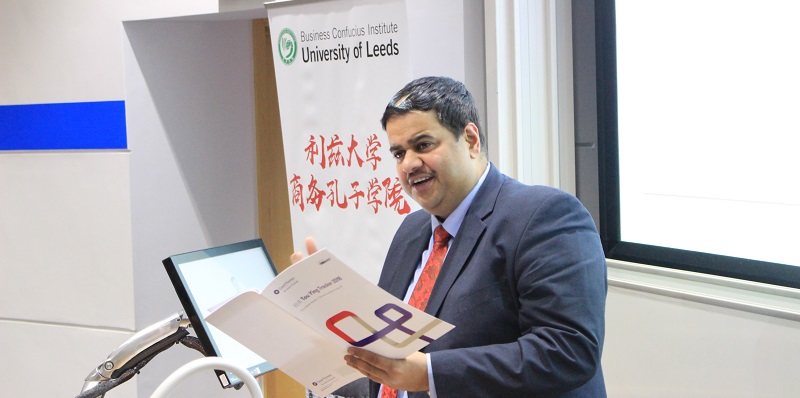Annual Lecture: Chandru Iyer on Chinese and Indian investment into the UK

The Business Confucius Institute Annual Lecture featuring Chandru Iyer took place at Leeds University Business School on 12 December 2019.
Chandru Iyer is Head of Business Development for Grant Thornton UK’s South Asia Group. In the lecture he discussed the methodology and findings of the annual Grant Thornton UK Tracker surveys.
Among the attendees were delegates from around the world who had just arrived in Leeds for the EIBA Annual Conference 2019.
The Grant Thornton UK Tracker surveys are developed using data from Companies House. The 2019 India meets Britain Tracker was compiled based on analysis of almost 850 companies and the 2018 Tou Ying Tracker analysed 750 companies.
Chandru gave a brief introduction to each report and summarised key findings before providing a comparative analysis and answering audience questions.
India meets Britain Tracker
The India meets Britain Tracker report was first produced in 2014 and is widely used and quoted by governments, trade bodies and diplomats.
According to the latest report, the top three fastest-growing Indian companies in the UK are:
- TMT Metal Holdings Limited
- Route Mobile (UK) Limited
- BB (UK) Ltd
Mr Iyer asked the Indians in the audience if they recognised these names and wasn’t surprised to see blank faces. TMT Metal Holdings, topping the list with growth of over 600%, trades in scrap metals. Chandru explained that Route Mobile (UK), a provider of cloud-communication platform services, is an example of an Indian company using the UK as a springboard to go into Africa and other developing countries. BB (UK) has the rights to design and supply Fila products to Europe.
After sharing a list of the 20 fastest-growing companies Chandru also highlighted others to watch. He believes that Uber has serious competition coming from Indian brand Ola, which started in smaller cities including Cardiff and York and started London operations earlier this month. Airbnb may be keeping an eye on Oyo Rooms, founded by a young Indian entrepreneur.
Tou Ying Tracker
There have been seven editions of the Tou Ying Tracker since 2013, with the eighth edition ready to be launched early in the New Year. Read the 2018 report here.
Chandru explained that Chinese investment in the UK tends to be more asset-heavy and revenue oriented, focusing on acquisitions rather than the movement of people seen with Indian investments.
Real estate is a key area of interest for Chinese investors - Chandru pointed out that the iconic London ‘gherkin’ building is owned by China’s largest manufacturer of soy sauce. Chinese investors also look for access to technology and IP through high tech investments, and like to buy brands.
13 out of the top 30 fastest-growing Chinese companies in the UK came from manufacturing and industrial sectors, while nine were from the technology, media and telecoms industry. The Tou Ying report points out that the two Chinese-owned telecommunications companies entering the 2018 Tracker benefited from “the boom in Chinese tourists visiting the UK and from a growth in the number of Chinese corporate clients”.
Comparison of Indian and Chinese investments in the UK
To end the lecture Chandru shared a simple analysis of the key characteristics of inward investment from each country.
India
- More greenfield investments
- Focus on tech/new age sectors
- Investment + people
- Accessing technology
China
- More acquisitions
- Focus on manufacturing/industry
- Big ticket investment
- Accessing brands
The 842 Indian companies had a combined turnover of £48 billion, combined with a combined turnover of £68 billion for the largest 750 Chinese companies in the UK.
The Indian companies employ almost 105,000 employees while Chinese companies employ 80,000.
Discussion
Audience questions covered topics including:
- The survey methodology and technology used
- Inward investment in Scotland and the North
- The anticipated effects of Brexit
- How Indian investment in the UK compares to UK investments in Europe, and the effect of a common language
- UK policy on inward investment in comparison with changes in EU regulations
During the discussion Chandru said that despite the sense of uncertainty none of these investors have moved out of the UK and are continuing their day-to-day business. He did identify VAT as a key issue if the UK leaves the single market, but also stated that the UK has a very open policy to inward investment.
He spoke about the difficulty of diverting investors' attention from Sydney when working in Australia, and recognised that for many, investment into the UK is synonymous with investment into London. The challenge facing the Leeds City Region and other regions is the process of educating investors and clearly communicating their USP.
Look out for the new Tou Ying Tracker Report in early 2020.
Find Chandru Iyer on Twitter and LinkedIn.
This article was first published on the Leeds University Business School website
Related News
Dr Catherine Xiang unravels the nuances of intercultural communication with China
The Business Confucius Institute welcomed Dr Catherine Xiang from the London School of Economics on Thursday 16 May 2024 to give a hybrid guest lecture about her recent book 'Bridging the Gap'.
Leeds alumna Marie Tulloch shares practical tips and inspiration
The Business Confucius Institute (BCI) welcomed Leeds graduate Marie Tulloch back to campus during Global Careers Week. This was an inspiring talk filled with practical insights about making a career using Chinese language skills.
An inspiring and practical talk from Sweaty Betty's VP (China), Lexie Morris
The Business Confucius Institute at the University of Leeds welcomed staff, students and guests at Leeds University Business School and online on Wednesday 7 February for a guest lecture by China market specialist Lexie Morris. Read about the event and some of the key messages she shared.
